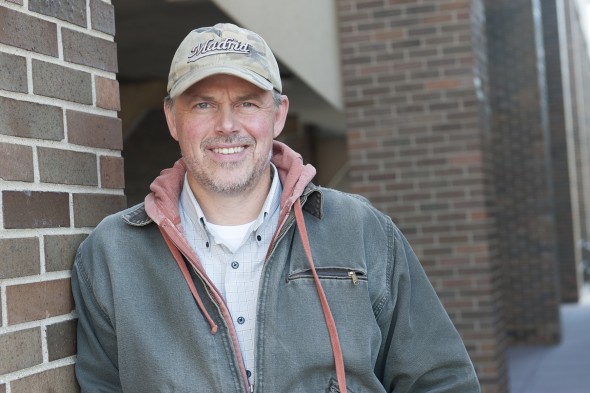Death Row: filmmaker focuses on families of inmate, victim

Oscar-nominated filmmaker Edgar Barens will follow the families of a death row inmate and victim in his next documentary. Photo: Roberta Dupuis-Devlin
Death Row inmates awaiting execution aren’t the only ones in limbo — their families are, too.
They are the subject of the new documentary by Oscar-nominated filmmaker Edgar Barens.
The idea arose from Barens’ trip to Dallas in May for a conference on families of the incarcerated. There he met Sandra Joy, author of the book Grief, Loss, and Treatment for Death Row Families.
She’d seen his film “Prison Terminal: The Last Days of Private Jack Hall,” nominated for an Academy Award in 2014.
“Her book was a page-turner for me — you never think of the families with someone on Death Row,” said Barens, a documentary specialist in the Jane Addams College of Social Work.
“They are vilified too. Many people assume that if you’re the parent of someone on Death Row, then you must have raised a monster.”
For his documentary, which has the working title “Misfortunate,” Barens will focus on both sides of the crime. The film will examine the family of a Death Row inmate and the family of the murder victim.
“There’s a weird parallel between the two,” the filmmaker said. “The family of the victim is grieving for obvious reasons. On the other hand, the family of the criminal is also grieving, waiting for the state to execute their loved one.”
To make the film, Barens plans to spend a lot of time on Death Row, and if the prison permits it, have his own cell there.
“I would hope to spend large amounts of time in the cell with the prisoner, in order to not only get the true feel of what it’s like to be in a cell 23 hours a day, week after week, month after month,” he said, “but also to truly get to know the prisoner, their crime and their thoughts about everything they have done in their life and in the lives of the people they destroyed — their biological family and the victim’s family.”
In the late ’90s Barens made a film called “A Sentence of Their Own,” which followed the family of a man who was serving a seven-year prison term.
“That sensitized me to families with someone on Death Row,” he said. “It was kind of a natural progression.”
On the road
Originally he’d planned to follow “Prison Terminal” with a film on the working conditions of the American trucker.
“They have no health care,” Barens said. “They sleep very little, their health is crap, and many are on the verge of a heart attack. Seventy percent are overweight and 30 percent are morbidly obese.”
However, he put the project on the back burner to continue his focus on the criminal justice system, a shared concern of the Jane Addams College of Social Work.
He’s spending much of his time on the road showing “Prison Terminal,” the story of a dying prison inmate cared for by hospice workers who are fellow prisoners.
To help spread the word about the benefits of prisoner-run, prison-based hospice programs, he’s taken the film to prisons, universities, churches, hospitals and hospice centers. More than 6,000 people have seen it, and other screenings are coming up.
Barens, who grew up in Aurora, earned bachelor’s and master’s degrees at Southern Illinois University in Carbondale.
Before joining UIC five years ago, he lived in New York, doing a variety of jobs, film and non-film related. He made his first prison film in Angola, Louisiana, about that prison’s hospice program.
He now lives in Montgomery, three miles from his childhood home, with his partner, Brian Tibbs, who is in workforce development for DuPage County.
His work in prisons reinforces his stance against the death penalty.
“I don’t think the state should have the power to kill people because they killed someone,” he said.
“Yes, these criminals must pay for their crime, but does taking their life correct the wrong that they did?”
Categories
Topics
Academy Awards, documentary, film, hospice, Oscar, prison, Prison Terminal, profile
